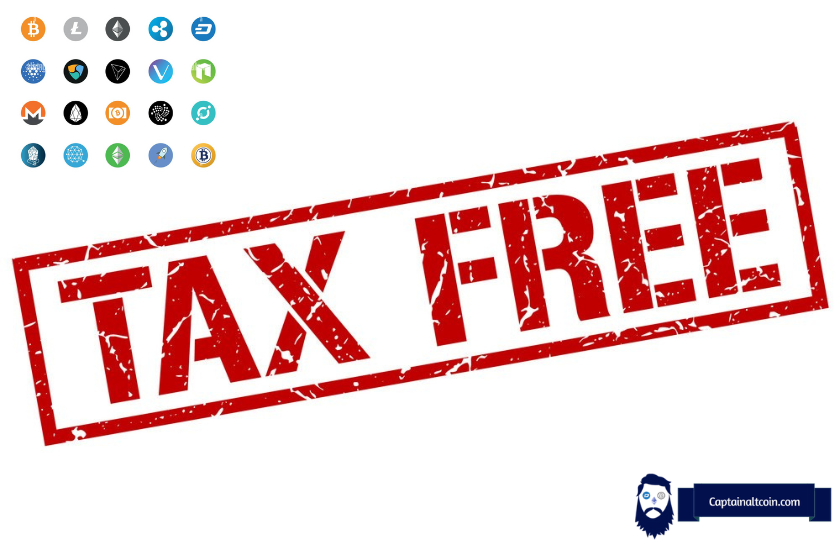
What you'll learn 👉
Top 10 crypto tax-free countries
While it’s true that some governments recognize cryptos as legitimate forms of currency, most still treat them as property and classify them as such under the law. As a result, investors must pay capital gains taxes whenever they sell off their holdings.
Crypto investors who make it big with their investments are often looked at with envy. However, many forget that not all of that money belongs to them – there is Uncle Sam (or some other “uncle”, they all function the same) that wants his cut of the pie. So, when cashing out your crypto gains, one important factor to consider is where you do it – whether the country offers favorable tax treatment to crypto investment.
Fortunately, there are several countries that offer favorable tax treatment to crypto investors. Here’s a look at the 10 best jurisdictions to invest in crypto:
Germany
Especially in comparison to other European countries, Germany is one of the crypto-friendliest countries in the world.
Cryptos are viewed as private assets rather than currencies for tax reasons in Germany. They are not subject to capital gains taxes like stocks or equities because they are private assets.

Profit from private sales of cryptos that generate less than 600 Euros in profit per year is exempt from taxation in Germany. Also, you won’t owe any taxes if you keep your coins for a full year without selling them. If you’re a German crypto investor with the patience to wait before selling your coins, this is fantastic news for you. Germany is forcing you to HODL, which is a hodler-friendly country in particular.
Slovenia
Regarding crypto taxes, Slovenia has two distinct systems, one for individuals and one for enterprises. In Slovenia, crypto assets are treated the same way as any other form of movable property.

Gains from the sale of movable property are exempt from personal income tax under Article 32 of the Personal Income Tax Act (commonly known as ZDoh-2). Therefore, Bitcoin sellers do not have to pay capital gains tax because their profits do not count as taxable income.
But businesses that accept crypto payments or generate crypto through mining must pay taxes at the standard corporate rate. Revenue earned from crypto-related business activities, such as mining, is subject to an annual 25% tax rate.
Belarus
Belarus’s tax rate is among the most lenient in both Eastern and Western Europe. The country made a pretty astute decision about Bitcoin in March of 2018. The country legalized crypto transactions and exempted all firms and individuals from any crypto tax until 2023, in contrast to most European countries that enacted various crypto tax rules during the Bitcoin boom.

Income and Capital Gains Taxes do not apply to any crypto-related activity, such as mining or day trading, because they are considered personal investments.
To bolster Belarus‘ digital economy, this novel law was drafted. This means that while Belarus is currently a crypto tax haven, this status may change following the 2023 review.
El Salvador
In September 2021, El Salvador became the first Latin American country to recognize Bitcoin as a legal tender, providing citizens with a government-issued digital wallet app and permitting the use of Bitcoin in all transactions. Bitcoin is increasingly widely accepted for everyday purchases and even large ones like cars and houses.

The government took this step so that it could promote itself as one of the few nations without a crypto tax, so luring more regional investment. That wasn’t the only thing, though.
They have declared that all non-resident aliens will not be required to pay taxes on any profits made from the sale of Bitcoin, providing a further incentive for people from other countries to relocate there. For this reason, El Salvador is a great destination to settle down if you’re a Bitcoininvestor.
Portugal
One of the most crypto-friendly countries, Portugal, has shown widespread support for the crypto market. The Portuguese Tax Authority has made Bitcointransactions and trading tax-free for private persons.

Profits made from trading cryptos are not subject to income tax or capital gains tax, and there are no taxes on the exchange of Bitcoinfor fiat cash. In addition, buying and selling cryptos is exempt from VAT.
Businesses that accept crypto as payment must pay value-added tax and income tax on the proceeds from these transactions.
However, the Portuguese Minister of Finance announced in May 2022 that crypto would be taxable in the not-too-distant future.
Singapore
Because of the absence of a capital gains tax, Singapore has earned the nickname “Investment Haven.” So, whether you make money by selling or trading crypto, you won’t have to worry about paying taxes on that money.

The government of Singapore agrees that cryptos are intangible assets. In other words, adopting crypto as a means of payment will result in the transaction being treated more like a barter trade. Your crypto token will not be subject to taxation, even though the underlying product or service may be.
There is a tax on profits for businesses that deal in crypto. This is likewise true for any enterprise whose major offering is the sale of cryptos.
Malaysia
Malaysia, Singapore’s neighbor, does not impose taxes on crypto.
Malaysian authorities do not consider cryptos as either capital assets or legal cash, hence crypto transactions involving private individuals are not subject to taxation.

The Malaysian Inland Revenue Board states that crypto transactions are not taxable if they do not occur frequently or consistently. So, if you’re a day trader, you’ll still have to pay taxes on your crypto gains.
Any crypto gains made by a company in Malaysia are subject to income taxation. These gains can be made with either traditional currency or crypto.
Malta
Malta has earned the nickname “Blockchain Island” because of its progressive stance toward cryptos.
The maximum level of acceptability of crypto as a means of the transaction can be found in the country where it is recognized as “a unit of account, medium of exchange, or store of value.”

In Malta, crypto investments are exempt from long-term capital gains taxes, and the acquisition and sale of cryptos are not subject to value-added tax. This is excellent news for those who plan to wait for the price of the crypto to rise before selling their holdings.
To the extent that you engage in crypto trading daily, you should expect to pay taxes equivalent to those associated with day trading stocks. In this instance, up to a 35% corporate income tax rate will be applied.
Cayman Islands
Over the course of several years, the Cayman Islands have established themselves as the preferred tax haven for investors in a wide range of commercial sectors. Similarly, the Cayman Islands are not among the countries that impose a tax on cryptos.

There is no income tax or capital gains tax in place for citizens. Furthermore, corporations are not required to pay any tax.
Therefore, the Cayman Islands do not impose any kind of tax on crypto businesses of any kind. This tropical paradise in the Caribbean is financially stable because of tourism, work permits, and the GST.
Switzerland
Regarding taxation, Switzerland has long been considered one of the best countries to live in the world. Crypto Valley is a term used to describe the country because of its progressive policies.
The crypto tax regulations in Switzerland are quite different from those in other nations, but that doesn’t mean you won’t have to pay taxes on your crypto earnings.

Crypto profits are exempt from Capital Gains Tax for individuals who are not trading professionally. Consequently, many crypto traders and sellers do not incur any tax liability.
To the extent that you are a qualified day trader or engage in crypto mining, you will be subject to income tax. In addition, you must pay an annual tax on your whole net worth (called the “Wealth Tax“). Your wealth tax rate varies per canton.
Crypto is a tax minefield
Crypto is generally considered a form of asset or commodity, similar to real estate or stocks, in the majority of nations. Sometimes both income and capital gains taxes apply to crypto transactions.
While the precise definition of crypto income varies from country to country, in general, income tax is due when:
- paying with crypto
- staking crypto
- getting crypto interest
- mining crypto
Hard forks and airdrops may potentially be subject to income tax in some jurisdictions.
You will always experience a capital gain or loss when you dispose of a capital asset. If you generate a profit, you must pay a capital gains tax. Disposals of crypto include:
- using crypto to buy goods or services
- trading one crypto for another
- trading in crypto for fiat money
- gifting crypto
In most nations, you’ll have to pay both income tax and capital gains tax if you mine crypto and subsequently sell it.
Tools that help you pay your cryptos
The easiest way to pay your taxes on crypto is with the help of crypto tools. The leading ones are Koinly, Zenledger, Coinledger and Cointracking.
They are all pretty similar in their offerings and pricing so it is more a question of taste which one will you pick to help you report your crypto taxes.
Click on the links below to read full reviews of each of them:
What are the worst countries for crypto tax?
These are some of the least crypto-friendly nations:
Netherlands
If you sell, trade, or spend your crypto, you will be subject to a fictitious gains tax rather than a Capital Gains Tax.

Holding on to crypto is not tax-free. Additionally, Income Tax may be owed on the proceeds of numerous crypto operations, including staking, mining, NFTs and DeFi operations.
Depending on your overall asset value, the tax on imaginary (non-realized) profits is only 0.54% to 1.58%.
Japan
In most cases, even when selling or exchanging crypto, which would ordinarily incur Capital Gains Tax, you will be liable to Miscellaneous Income Tax instead.

The tax rate on capital gains is far less than the rate on ordinary income. Japan’s top income tax rate of 55% is among the world’s highest. Stock market gains are only taxed at a 20% rate.
France
Trading crypto for crypto is tax-free, however, crypto is subject to multiple taxes at very high rates in France.

How often you invest, whether you mine, and whether you trade professionally are all factors. The 30% Single Fixed Levy is paid by casual traders. A 45% Business Income Tax is levied on those who engage in professional trading or crypto mining.
FAQs
The Cayman Islands has the lowest crypto tax. Aside from them, Germany, Slovenia, and Portugal are almost crypto-tax-free countries. The Cayman Islands are a crypto tax haven for enterprises and private individuals. Businesses are not subject to corporate taxes under the Cayman Islands Monetary Authority, and residents are not subject to income or capital gains taxes.
Yes, Dubai is crypto tax-free. Dubai has a solid regulatory framework in place for cryptos. It’s the nation for crypto investors that is simple to relocate to, has legal clarity, levies no income taxes, and doesn’t require any reporting.
There are a few ways to avoid paying tax on crypto, but the simplest strategy is HODL. You must keep your crypto investment for at least a year before selling it. In that case, you won’t pay taxes in German, Switzerland, Portugal, Dubai, etc.
Most nations will impose an income tax, capital gains tax, or sometimes both on crypto.
Yes, Switzerland is crypto tax-free if you do not trade professionally, i.e., profits from crypto are free from capital gains tax. As a result, many crypto buyers and sellers have no tax obligations.
Yes, Germany is crypto tax-free. Personal crypto profits are excluded from taxation in Germany if the total profit from private sales transactions throughout the year was less than 600 Euros. Sales of cryptos kept for more than a year are also exempt from taxation.
Some of the countries that have the highest tax on crypto are Japan (55%), Belgium (33%), France (30%), South Korea (24%), etc.







